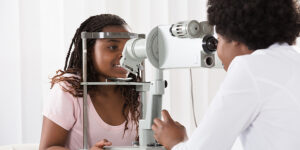
by Dick Hall-Sizemore
One of the constants over the many years that I have been around or following the Virginia General Assembly has been the fight between optometrists and ophthalmologists.
The legislative battles between these two groups provide a good lesson in two aspects of the legislative process: the politics of regulation of professions and the role of campaign money. This article will discuss the first aspect and a subsequent article will examine the role of campaign donations.
The ongoing battle of the optometrists and the ophthalmologists has been over treatment of conditions of the eye beyond vision defects. Ophthalmologists have been to medical school and specialize in diseases of the eye. Although they have the title of “doctor,” optometrists have not been to medical school, but have undergone training that enables them to examine patients for vision problems and prescribe corrective lenses. During their vision examinations, if they detect any medical problems, they are supposed to refer the patient to an ophthalmologist.
It started off with the “drops in the eye” bill. Administering “drops” in the eyes would enable optometrists to expand, beyond vision testing, the types of procedures they could perform. They argued that they were sufficiently trained to undertake such activities and their being able to do so would improve access to eye care for the public. The ophthalmologists countered that only medically trained personnel should be allowed to perform such procedures.
It took a few years, but, eventually, the optometrists won out. Since then, they have systematically and gradually expanded the scope of what they are allowed to do. In 2018, for example, the General Assembly enacted SB 511, authorizing optometrists to administer limited injections of Schedule IV steroids to treat a chalazion, a type of cyst in the eyelid, usually due to a blocked gland. The legislation included language expanding the scope of the practice of optometry to include the “evaluation, examination, diagnosis, and treatment of abnormal or diseased conditions of the human eye and its adnexa by the use of medically recognized and appropriate devices, procedures, or technologies.” However, the language specifically prohibited optometrists from providing “treatment through surgery, including laser surgery”.
The front this year in this ongoing battle is an attempt to breach the prohibition on surgery. SB 375 (Petersen, D-Fairfax) would authorize optometrists to perform three specific laser eye surgeries used to treat glaucoma and the effects of cataract surgery. Based on the coverage of the debate over the bill in a Senate subcommittee by the Richmond Times Dispatch, the basic arguments have not changed. The optometrists pointed out that members of their profession have been allowed to perform these procedures in eight states. The success rate in those states demonstrates that optometrists are qualified to perform. Allowing optometrists to perform these procedures, argued the lobbyist for the Virginia Optometric Association, would provide patients with a continuity of care.
The ophthalmologists appearing before the subcommittee contended that the bill is not needed because there is no shortage of eye physicians in the Commonwealth and there would be no cost savings for patients. Furthermore, because laser surgery is “intensely precise,” allowing practitioners other than trained physicians to perform the procedures would be “putting peoples’ eyes at risk.”
The subcommittee voted 5-3 to recommend to the full committee that the bill be reported.
This legislation can be viewed from two perspectives:
- One group, which has barriers to entry into its membership, is attempting to maintain its control over a lucrative area in the face of an attempted incursion by another group, with both groups claiming their positions are in the best interests of the public.
- A continuation of the recent movement to allow non-physicians, trained in specific medical areas, to perform some of the procedures formerly reserved for doctors.
I don’t consider myself sufficiently qualified to weigh in on this question of whether optometrists should be allowed to perform certain types of eye surgery. Furthermore, I am not entirely comfortable with legislators making these types of judgments. However, as Senator Saslaw, D-Fairfax, pointed out, ophthalmologists have for years been protesting the expansion of the scope of optometry, predicting “the end of civilization. And that just hasn’t happened.” Lastly, I note that, during my last eye exam, an optometric technician did most of the work that an optometrist had done in the past.

Leave a Reply
You must be logged in to post a comment.